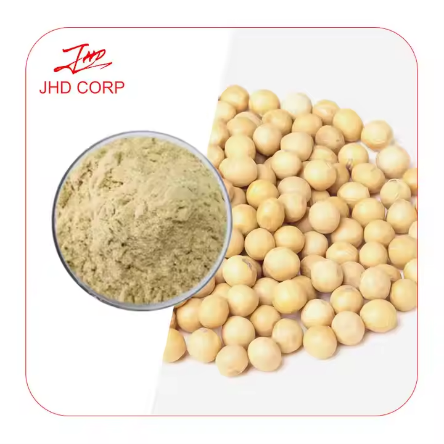Welcome to JHD Nutrasource!
Shop
Soybean protein
Soybeans (Glycine max) are a type of legume native to East Asia and one of the most widely cultivated crops globally. They are an excellent source of plant-based protein, containing all nine essential amino acids, and are rich in vitamins, minerals, and phytonutrients such as isoflavones and fiber. Soybeans are versatile and can be processed into various food products.
Description
Function
- Nutritional Value: Soybeans are high in protein (about 36%–40%) and contain a good balance of essential amino acids. They are also a significant source of dietary fiber, vitamins (such as B vitamins), and minerals (like iron, magnesium, and potassium).
- Health Benefits:
- Cardiovascular Health: Soybeans contain isoflavones (e.g., genistein and daidzein) that may help lower cholesterol levels and reduce the risk of heart disease.
- Bone Health: They are a good source of calcium and other minerals that support bone density.
- Menopausal Symptoms: Isoflavones in soybeans may help alleviate menopausal symptoms such as hot flashes.
- Cancer Prevention: Some studies suggest that soybeans may reduce the risk of certain cancers, particularly breast and prostate cancer.
- Digestive Health: The high fiber content in soybeans aids digestion and promotes gut health.
- Sustainability: Soybeans are a sustainable crop, requiring less water and land compared to animal-based protein sources.
Application
- Food Industry:
- Soy Milk: A popular dairy alternative made from soybeans.
- Tofu and Tempeh: Versatile plant-based protein sources used in various dishes.
- Edamame: Immature soybeans often consumed as a snack or in salads.
- Soy Flour: Used in baking and as a thickening agent.
- Soy Protein Isolate: A highly concentrated form of soy protein used in protein bars, shakes, and other supplements.
- Animal Feed: Soybeans and soy meal are widely used in livestock feed due to their high protein content.
- Industrial Uses:
- Biofuels: Soybeans are used to produce biodiesel.
- Plastics and Adhesives: Soy-based materials are used in the manufacturing of biodegradable plastics and adhesives.
- Health and Nutrition:
- Dietary Supplements: Soy protein is a common ingredient in protein powders and supplements.
- Functional Foods: Soybeans are added to various food products to enhance their nutritional value.

